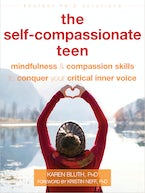By Karen Bluth, PhD, author of The Self-Compassionate Teen
You may put pressure on yourself to become the successful person that all the adults in your life want you to be. And yet maybe there’s this little voice inside you crying out, “This is too much for me! Maybe I’m just not smart enough! Maybe I don’t have what it takes! Why can’t I relax and just be me! Why can’t that be enough?” How can you be yourself amid all this pressure to be the perfect honor roll student or all-state athlete that everyone wants you to be?
Maybe you feel like a total failure because you simply can’t seem to measure up, can’t seem to sail through your schoolwork and be that A student that everyone thinks somehow you should be. What can you do? Here’s one idea: In the middle of all this stress-making craziness, you can be a good friend to yourself. You can be a support to yourself. You can be there for yourself to calm yourself down, to tell yourself it will all be okay, that it will all work out one way or another. In other words, tell yourself precisely what you would tell a good friend who was going through the same thing. If you can say it to a good friend, you can say it to yourself, right? And, if you’re not so sure that it matters whether you’re a good friend to yourself, think of it this way: Research tells us that when we are kinder to ourselves, we are less stressed, less depressed, and less anxious. And of course, being less stressed helps you do better in school. So, being kind to yourself can actually, in the long run, reduce school-related stress and help you be more effective.
The next practice will show you how you can do this. It’s called Compassionate Friend, and the original version comes from Paul Gilbert, founder of compassion-focused therapy (CFT); this version is from the teen self-compassion program, Making Friends with Yourself. An important thing to remember when you’re doing this practice, and actually all practices in this book, is to do them slowly. There’s no rush—this isn’t school, and it’s actually not more efficient or effective to get done quickly. It’s important to allow the words to sink in, and to do that you have to take your time and proceed slowly. It will work its magic better that way.
Meditation: Compassionate Friend
You can download audio for this meditation at https://www.newharbinger.com/45274.
• Either seated or lying down, close your eyes and take a few deep breaths. Allow yourself to relax, and let the chair or ground support you. With each breath, see if you can let go a little more, and relax a little more.
• Now allow yourself to imagine a place where you feel safe, comfortable, and relaxed—this can be a real place or an imagined place, but it should be a place that allows you to breathe comfortably and let go of any worry. Perhaps in nature—a beach, a place in the woods near a brook—or maybe it’s a corner of your bedroom or the comfort of a good friend’s house. It might even be an imaginary place, like floating on a cloud, or maybe a room full of super-comfy quilts. Imagine this place in as much detail as you can—the sounds, the smells, any physical sensations, and most of all what you feel like in this place.
• Soon you’ll receive a visitor…a warm and kind friend. This is someone who loves you completely and accepts you exactly for who you are. This can be real person—a friend, maybe a grandparent, or a favorite teacher—or it can be someone from a book you’ve read, a pet, a superhero, or even a character from a comic book or movie. Or it can be some being that you create in your mind. Imagine this being in as much detail as possible, especially how it feels to be in their presence.
• Soon you will be greeting your kind friend. You have a choice—you can either go out from your safe place to meet your friend or you can invite them in. Either way is fine; do whichever is most comfortable for you. Imagine that you are doing that now.
• Now imagine yourself sitting with the person at just the right distance away from them—whatever feels right for you. You feel completely comfortable and safe, completely accepted and loved. This is just where you need to be right now.
• Take a moment to enjoy how you feel in the presence of your special friend. This being is here with you now and understands exactly what it’s like to be you, exactly where you are in your life right now, and precisely what you struggle with. This being knows that you are doing the best you can for where you are in your life. They know you better than anyone else, and they love and accept you completely. Even when you fail—especially when you fail.
• This being has something important to say to you, something that’s exactly what you need to hear right now. See if you can listen closely for the words they want to share, words that are comforting, supportive, and kind. Maybe something like, “Don’t be so hard on yourself for choosing those kids to do the history project with. You just want to be accepted and loved. That is totally human. We all want to be loved.” And if no words come, that’s okay too. Just enjoy being in the presence of your compassionate friend.
• Now, maybe you have something you’d like to say to your friend. This friend is a very good listener, and completely understands you. Is there anything you’d like to say?
• Enjoy your friend’s good company for a few last moments, and wave goodbye to them, knowing you can invite them back whenever you need to.
• You are now alone in your safe place again. Spend a few moments thinking about what just happened, maybe reflecting on the words you heard.
• And before this meditation ends, please remember that this compassionate friend is a part of you. The loving presence you felt and the words you heard are a deep part of yourself. The comfort and safety that you may be feeling is always there within you. Know that you can return to this safe place and to this compassionate friend whenever you need to.
• Now bring your attention back to your breath, and when you feel ready, gently open your eyes. Were you surprised to find that the kind friend was actually a part of you? When most people—both adults and teens—finish this meditation, they are often surprised that the friend is a voice inside them. But it has to be, right? Because you created this being in your mind. You thought up what they looked like, how you felt in their presence, the words they said. So truly, this means that you have this kind, loving voice inside you at all times—this kind voice that will offer you support and acceptance whenever you need it. Your own true voice.
Excerpted from The Self-Compassionate Teen
Karen Bluth, PhD, earned her doctoral degree in child and family studies at the University of Tennessee. She is currently assistant professor in the department of psychiatry, and research fellow at the Frank Porter Graham Child Development Institute at The University of North Carolina at Chapel Hill. Her research focuses on the roles that mindfulness and self-compassion play in promoting well-being in teens.
In addition to her research, Bluth regularly teaches mindfulness and mindful self-compassion courses to both adults and teens through the Frank Porter Graham Program for Mindfulness and Self-Compassion for Families, which she founded. She regularly gives talks and leads workshops at schools and universities. Bluth codeveloped Making Friends with Yourself: A Mindful Self-Compassion Program for Teens and Young Adults, which is the adaptation of Kristin Neff and Christopher Germer’s Mindful Self-Compassion program tailored for an adolescent population. A former educator with eighteen years’ classroom experience, Bluth is currently associate editor of the academic journal, Mindfulness.



 2024 Peace Playbook: 3 Tactics to Avoid Clashes with Your Partner
2024 Peace Playbook: 3 Tactics to Avoid Clashes with Your Partner